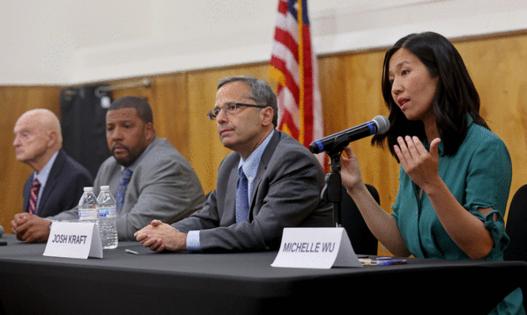Wu to run unopposed: Boston mayoral recount confirms DaRosa won't replace Kraft on election ballot
Published in News & Features
BOSTON — Boston Mayor Michelle Wu’s path to a second term was all but cleared with the conclusion of a three-day mayoral preliminary election recount, which resulted in no material changes and officially kept any challengers off the ballot.
The recount, requested by third-place finisher and community activist Domingos DaRosa, concluded Monday afternoon at City Hall. While DaRosa picked up 19 votes, bringing his total 2,428 votes, he fell far short of the 3,000-vote threshold he needed to get on the November general election ballot.
Josh Kraft, the runner-up in this month’s preliminary election, dropped out of the race after his 49-point defeat to Wu. Per state law, DaRosa, as the third-place finisher, could have replaced him on the ballot had he received a number of votes that was equal to the 3,000 signatures required to qualify as a mayoral candidate.
Before the results were announced, DaRosa said he didn’t expect the recount to result in changes that would get him on the ballot. Rather, he said calling for a recount was about highlighting how the odds were stacked against him and the other candidate, Robert Cappucci, in a race that was widely seen as being between Wu and Kraft, a son of the billionaire New England Patriots owner Robert Kraft.
“What we’re expecting is to have folks fully take a look at how marginalized Robert Cappucci and myself was throughout this whole process — how a lot of the information put out by the mainstream media favored the two candidates,” DaRosa told the Herald. “(It was) also putting the spotlight on how outdated some of the languages are out there.
“I should automatically be brought into the second position, regardless of how many votes were cast on the 9th (of September),” DaRosa said. “A lot of folks are upset. We’re going to see a lot of communities really get marginalized, and there’s going to be even more disconnect, and it’s going to be real hard to get people engaged in the next election because of what transpired in this election.”
DaRosa said he expects voter turnout to take a nosedive in November because Wu will be the only name on the mayoral ballot, leaving City Council seats as the only remaining contested races in the general election. People were expecting two mayoral candidates on the ballot, he said, and were left without a “real election.”
“To have the Kraft campaign just withdraw hours after the preliminary, what was the real intention?” DaRosa said. “Was it really for empowering Bostonians, or was it for personal gain? There’s mixed feelings about that.”
DaRosa said he plans to run for mayor again in 2029.
The final results, accepted by the Boston Election Commission on Monday, also led to Wu, Kraft and Cappucci picking up votes in the partial recount, which encompassed five of the city’s 22 wards.
Wu picked up 461 votes to bring her final total to 66,859. Kraft’s vote count increased by 157, to 21,481, and Cappucci’s final tally was 2,091, reflecting an additional 17 votes.
The Wu campaign thanked the Elections Department for administering and certifying the results of the preliminary election, while touting the mayor’s “overwhelming” win.
“I’m grateful to each one of the nearly 94,000 Boston voters who showed up for our democracy, and I’m humbled by the overwhelming support across every neighborhood and every ward to keep going in our work to make Boston a home for everyone,” the Wu campaign said in a statement. “Over the next six weeks, our team will continue to organize alongside the City Council candidates to get out the vote for the Nov. 4 final election.”
_______
©2025 MediaNews Group, Inc. Visit at bostonherald.com. Distributed by Tribune Content Agency, LLC.







Comments